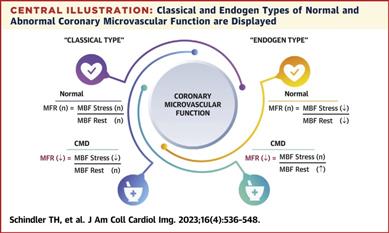Myocardial Perfusion PET for the Detection and Reporting of Coronary Microvascular Dysfunction: A JACC: Cardiovascular Imaging Expert Panel Statement |
| |
| Affiliation: | 1. Mallinckrodt Institute of Radiology, Division of Nuclear Medicine-Cardiovascular, Washington University in St Louis School of Medicine, St Louis, Missouri, USA;2. Division of Cardiovascular Medicine and Cardiovascular Institute, Stanford University School of Medicine, Stanford, California, USA;3. VA Palo Alto Health Care System, Palo Alto, California, USA;4. Department of Medical Imaging, Montreal Heart Institute, Montréal, Québec, Canada;5. University of Perugia School of Medicine Ospedale S. Maria della Misericordia Perugia, Italy;6. Cardiologicum Stuttgart, Stuttgart, Baden-Wuerttemberg, Germany;7. University of Ottawa Heart Institute, Ottawa, Ontario, Canada;8. Icahn School of Medicine at Mount Sinai, Zena, New York, New York, USA;9. Michael A. Wiener Cardiovascular Institute, New York, New York, USA;10. Mount Sinai Heart, Icahn School of Medicine at Mount Sinai Health System, New York, New York, USA;11. Saint-Lukes Health System and the Mid-America Heart Institute, University of Missouri-Kansas City School of Medicine, Kansas City, Missouri, USA;12. Cardiac Division, Massachusetts General Hospital, Harvard Medical School, Boston, Massachusetts, USA;13. Cardiology, St Luke’s University Health Network, Bethlehem, Pennsylvania, USA;14. Heart Center, Turku University Hospital, Turku, Finland;15. Mayo Clinic, Rochester, Minnesota, USA;p. Medical Imaging Center, Departments of Radiology and Nuclear Medicine and Molecular Imaging, University Medical Center Groningen, University of Groningen, Groningen, the Netherlands;q. Department of Cardiology, Inselspital, University of Bern, Switzerland;r. Department of Nuclear Medicine, Cardiac Imaging, University Hospital Zurich, Zurich, Switzerland;s. Hypertrophic Cardiomyopathy Center of Excellence, University of California, San Francisco, California, USA;t. Cardiovascular Imaging Program, Departments of Radiology and Medicine, Brigham and Women’s Hospital, Boston, Massachusetts, USA;u. The University of Newcastle, Faculty of Medicine, Newcastle, Australia;v. San Raffaele Hospital, Milan Italy;w. Vita Salute University, Milan, Italy;x. Department of Molecular Imaging and Medical Pharmacology, David Geffen School of Medicine at UCLA, Los Angeles, California, USA;y. Department of Diagnostic Radiology and Nuclear Medicine, University of Maryland School of Medicine, Baltimore, Maryland, USA |
| |
| Abstract: | 
Angina pectoris and dyspnea in patients with normal or nonobstructive coronary vessels remains a diagnostic challenge. Invasive coronary angiography may identify up to 60% of patients with nonobstructive coronary artery disease (CAD), of whom nearly two-thirds may, in fact, have coronary microvascular dysfunction (CMD) that may account for their symptoms. Positron emission tomography (PET) determined absolute quantitative myocardial blood flow (MBF) at rest and during hyperemic vasodilation with subsequent derivation of myocardial flow reserve (MFR) affords the noninvasive detection and delineation of CMD. Individualized or intensified medical therapies with nitrates, calcium-channel blockers, statins, angiotensin-converting enzyme inhibitors, angiotensin II type 1-receptor blockers, beta-blockers, ivabradine, or ranolazine may improve symptoms, quality of life, and outcome in these patients. Standardized diagnosis and reporting criteria for ischemic symptoms caused by CMD are critical for optimized and individualized treatment decisions in such patients. In this respect, it was proposed by the cardiovascular council leadership of the Society of Nuclear Medicine and Molecular Imaging to convene thoughtful leaders from around the world to serve as an independent expert panel to develop standardized diagnosis, nomenclature and nosology, and cardiac PET reporting criteria for CMD. This consensus document aims to provide an overview of the pathophysiology and clinical evidence of CMD, its invasive and noninvasive assessment, standardization of PET-determined MBFs and MFR into “classical” (predominantly related to hyperemic MBFs) and “endogen” (predominantly related to resting MBF) normal coronary microvascular function or CMD that may be critical for diagnosis of microvascular angina, subsequent patient care, and outcome of clinical CMD trials. |
| |
| Keywords: | coronary artery disease coronary circulation coronary flow reserve microvascular dysfunction myocardial blood flow myocardial perfusion imaging positron emission tomography CAD" },{" #name" :" keyword" ," $" :{" id" :" kwrd0050" }," $$" :[{" #name" :" text" ," _" :" coronary artery disease CFC" },{" #name" :" keyword" ," $" :{" id" :" kwrd0060" }," $$" :[{" #name" :" text" ," _" :" coronary flow capacity CFR" },{" #name" :" keyword" ," $" :{" id" :" kwrd0070" }," $$" :[{" #name" :" text" ," _" :" coronary flow reserve CMD" },{" #name" :" keyword" ," $" :{" id" :" kwrd0080" }," $$" :[{" #name" :" text" ," _" :" coronary microvascular dysfunction CVR" },{" #name" :" keyword" ," $" :{" id" :" kwrd0090" }," $$" :[{" #name" :" text" ," _" :" coronary vascular resistance FFR" },{" #name" :" keyword" ," $" :{" id" :" kwrd0100" }," $$" :[{" #name" :" text" ," _" :" fractional flow reserve IMR" },{" #name" :" keyword" ," $" :{" id" :" kwrd0110" }," $$" :[{" #name" :" text" ," _" :" index of microcirculatory resistance MBF" },{" #name" :" keyword" ," $" :{" id" :" kwrd0120" }," $$" :[{" #name" :" text" ," _" :" myocardial blood flow MFR" },{" #name" :" keyword" ," $" :{" id" :" kwrd0130" }," $$" :[{" #name" :" text" ," _" :" myocardial flow reserve PET" },{" #name" :" keyword" ," $" :{" id" :" kwrd0140" }," $$" :[{" #name" :" text" ," _" :" positron emission tomography |
| 本文献已被 ScienceDirect 等数据库收录! |
|

